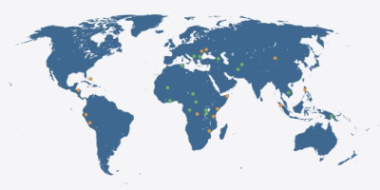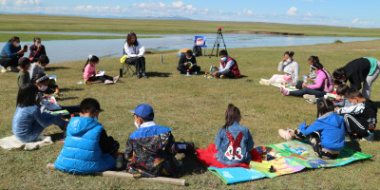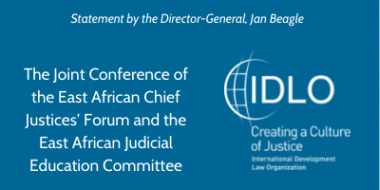Building Judicial Capacity

Efficient, equitable and accessible justice systems are the lifeblood of the rule of law. For many years, building judicial capacity in the developing world was IDLO's sole area of intervention.
Today, while our mission and expertise has greatly expanded, we remain faithful to that early purpose. Building capacity in the judiciary is still the bulk of what we do, and what we are most recognized for. We do this in a variety of legal systems and traditions, working with local and international partners, with a strong emphasis on transition societies.
In the words of Kyrgyz Supreme Court Chair and IDLO interlocutor Feruza Z. Djumasheva, "Without successful judicial reforms, there will be no economic or social reform."
Checks and balances: independence of judiciary and parliaments
“It’s about building people’s confidence in the courts,” explained IDLO Director-General Irene Khan on the topic of why judicial independence matters. “What are the issues of independence, integrity, approach, principle, ethics that build people’s trust in the judiciary?”
Evaluation of the project "Support to Kenyan Constitutional Implementation Process with a Focus on Devolution and Gender Reforms"
As part of IDLO’s continuous commitment to accountability and results-based management, IDLO is pleased to share this Evaluation Brief (summarised evaluation report): “Thematic Evaluation of the International Development Law Organization's (IDLO) Support to the Kenyan Constitution Implementation Process with a Focus on Devol
Independence of the Judiciary - Why Parliaments Should Care
HIGH-LEVEL PUBLIC EVENT
An independent judiciary is critical to promoting peaceful and inclusive societies as envisaged in Goal 16 of the 2030 Agenda for Sustainable Development.

Making a difference in the "most corrupt country" in Europe
Languages: English - Pусский

Finances, foundations and fruit - 2016 in Kyrgyzstan
Languages: English - Pусский
Fred Huston, Country Director. Our work in the justice and rule of law arena in Kyrgyzstan in 2016 took place against a backdrop of ongoing public dissatisfaction with the performance of the judiciary. Many people here still try to blame the judiciary for the ills of the country.
Electoral and gender justice: IDLO DG visits Kenya
As five African countries, including Kenya, gear up for elections later this year, IDLO’s Director-General, Irene Khan, visited Nairobi to support ongoing work in the country and met with officials to discuss electoral justice, good governance and gender equality.

Strong dispute resolution system key to 2017 Kenya elections
Press release: (Nairobi, Kenya) May 4, 2017 – As five countries in Africa, including Kenya, gear up for general elections later this year, a new report published today by the International Development Law Organization (IDLO) highlights the need for a strong judicial electoral dispute resolution mechanism.
“As a contest for political power, elections by their nature invite disputes. Effective electoral dispute resolution is therefore key to preventing electoral violence and ensuring legitimacy of the results,” said Ms. Irene Khan, IDLO Director-General.
IDLO Director-General to visit Kenya to discuss electoral justice and gender equality
Media Advisory: Interview Availability. Nairobi, April 27, 2017 - The Director-General of the International Development Law Organization (IDLO) will visit Kenya from May 3 to 5, 2017 to discuss electoral justice, gender equality and the rule of law with representatives of the Government of the Republic of Kenya, the judiciary, the legislative, diplomatic community, civil society and the women’s movement.
Lessons Learned Brief - Avoiding Violence and Enhancing Legitimacy: Judicial Preparedness for Handling Electoral Disputes in Kenya and Beyond
The Brief (or Lessons Learned Brief), titled Avoiding Violence and Enhancing Legitimacy: Judicial Preparedness for Handling Electoral Disputes in Kenya and Beyond, explores IDLO’s support to the Kenyan judiciary to resolve electoral disputes. The 2007 electoral violence in Kenya demonstrated that disastrous consequences can follow when the electoral dispute resolution system is not trusted to deal fairly and efficiently with contested elections.
Pages
Key Initiatives
-
 Lack of good governance and the rule of law are one of the most pressing problems confronting modern Somalia on its path towards stability and reconstruction. While there have been signs of progress, the absence of robust and competent institutions has contributed to a climate of insecurity and impunity. Several assessments of the justice system in Somalia have found that judges and prosecutors lack of adequate skills to effectively administer criminal trials in line with Somali laws and procedures, particularly with respect to safeguarding the rights of the accused.
Lack of good governance and the rule of law are one of the most pressing problems confronting modern Somalia on its path towards stability and reconstruction. While there have been signs of progress, the absence of robust and competent institutions has contributed to a climate of insecurity and impunity. Several assessments of the justice system in Somalia have found that judges and prosecutors lack of adequate skills to effectively administer criminal trials in line with Somali laws and procedures, particularly with respect to safeguarding the rights of the accused. -
 Despite reform efforts undertaken by the Government of Ukraine after the Maidan Revolution in 2014, Ukrainian citizens continue to regard criminal justice stakeholders with deep distrust. In 2019, the presidential and snap parliamentary elections resulted in a shift of the political environment, creating an opportunity to meaningfully advance anti-corruption reforms.
Despite reform efforts undertaken by the Government of Ukraine after the Maidan Revolution in 2014, Ukrainian citizens continue to regard criminal justice stakeholders with deep distrust. In 2019, the presidential and snap parliamentary elections resulted in a shift of the political environment, creating an opportunity to meaningfully advance anti-corruption reforms. -
 Strengthening the capacity of prosecutors, judges and lawyers in Rwanda in international criminal law is both important and timely. Over two decades after Rwanda’s genocide, the number of cases extradited and transferred from other countries to Rwanda continues to increase. Given that international criminal law is a complex and evolving field, prosecutors who appear in Transfer cases would benefit from skills allowing them to more accurately and effectively research and apply the latest judicial precedents.
Strengthening the capacity of prosecutors, judges and lawyers in Rwanda in international criminal law is both important and timely. Over two decades after Rwanda’s genocide, the number of cases extradited and transferred from other countries to Rwanda continues to increase. Given that international criminal law is a complex and evolving field, prosecutors who appear in Transfer cases would benefit from skills allowing them to more accurately and effectively research and apply the latest judicial precedents. -
 In Indonesia, with its civil law system, many scholars believe that lecturers do not have any obligation to use case law or jurisprudence, including among judges. This causes stagnant development of the law both in practice and theory. Therefore, integrating case law into education will not only be beneficial to both student and lecturer, but also for the judges so they can employ better consideration when making their decisions or verdicts.
In Indonesia, with its civil law system, many scholars believe that lecturers do not have any obligation to use case law or jurisprudence, including among judges. This causes stagnant development of the law both in practice and theory. Therefore, integrating case law into education will not only be beneficial to both student and lecturer, but also for the judges so they can employ better consideration when making their decisions or verdicts. -
 Until recently, court processes in the Kyrgyz Republic have not been automated. Manual or paper systems still are required and are the norm although automating all processes has started very actively. According the country’s National Target Program for Development of the Judiciary, automated information systems need to be expanded and rolled out to the whole judicial system, not only within all first instance courts, but also second and third instance courts.
Until recently, court processes in the Kyrgyz Republic have not been automated. Manual or paper systems still are required and are the norm although automating all processes has started very actively. According the country’s National Target Program for Development of the Judiciary, automated information systems need to be expanded and rolled out to the whole judicial system, not only within all first instance courts, but also second and third instance courts.
Latest Activity
|
Policy Statements
|




